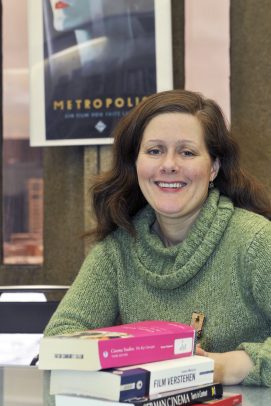Excellence in Teaching: Sara Hall
Each year, UIC honors some of its most dedicated and outstanding teachers with the Award for Excellence in Teaching. The winners, who receive a $5,000 salary increase, are selected by past recipients of the award from nominations made by departments and colleges.
Years at UIC: 18
What does it mean to win the Excellence in Teaching Award?
The Excellence in Teaching Award is a testament to the importance of high-quality teaching in UIC’s research-intensive environment. It is not possible to make discoveries or forge new scholarship without a common foundation of knowledge and a well of inspiration — and those cannot be transmitted through book learning alone. The Excellence in Teaching Award acknowledges that we do much more in the classroom than just transmit facts or teach operational skills — we create communities of inquiry.
What do you teach?
I teach courses in the Department of Germanic Studies and the Minor in Moving Image Arts, in German or English depending on the class. My most frequent offerings are a general education survey of German cinema (GER 217) and graduate courses on gender and cultural studies. Occasionally, I have the opportunity to offer seminars squarely in my areas of specialization, such as “Studying Silent Cinema” or “German Cinema in Transnational Contexts.”
How do you engage students in your courses?
I begin each semester surveying students about their interests, motivations and desired course outcomes. I strive to connect the topics and problems that matter to specialists in my field to the experiences, concerns and educational goals of the learners in the room. I create activities and assignments where students, instead of just digesting the existing literature on a subject, speak and write back to the texts and the experts and to each other, infusing new interpretations and insights into an ongoing critical conversation around media texts and their histories. I also encourage students to express their insights and demonstrate their learning in a variety of media, including new digital forms.
What do you enjoy most about teaching at UIC?
I deeply appreciate how engaged the students are in the world that surrounds and intersects with the classroom. Students at UIC are eager to collaborate and to discover or create something new, something that contributes to a larger local or global conversation. The city of Chicago provides unparalleled opportunities for students to understand and apply their learning in action.
What are your research interests?
I am a film and television historian, with a focus on Germany and Austria. I am especially interested in the relationship between popular culture and democratic social formations, as well as institutional applications of new visual recording technologies. I am working on two book projects right now, one on the ways the police in Berlin in the 1920s mobilized moving images in their work and the interface between law enforcement and the entertainment industry and one on historical erasure in US remakes of German films since World War II.
What is your advice to students who just graduated Dec. 15?
Stay curious and always ask “Why?” “How did it get this way?” and “What difference does this make?” Nothing you read, see, or listen to is inevitable or just a “matter of fact” — every text or performance is the product of a series of formal, rhetorical, and aesthetic choices and each of those choices has a tangible impact on readers, viewers and listeners. And those impacts have social and political ripple effects. Continue to be a culture and history detective no matter what line of study or work you go into after college.

